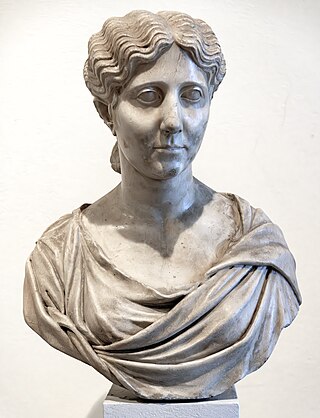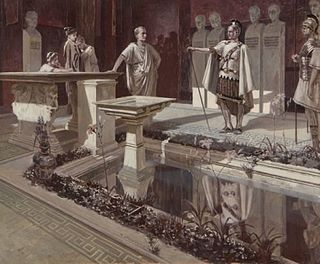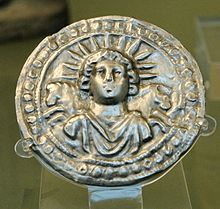
The Vorkosigan Saga is a series of science fiction novels and short stories set in a common fictional universe by American author Lois McMaster Bujold. The first of these was published in 1986 and the most recent in May 2018. Works in the series have received numerous awards and nominations, including five Hugo award wins including one for Best Series.

The 50s decade ran from January 1, 50, to December 31, 59. It was the sixth decade in the Anno Domini/Common Era, if the nine-year period from 1 AD to 9 AD is considered as a "decade".

Antonia Minor was the younger of two surviving daughters of Mark Antony and Octavia Minor. She was a niece of the Emperor Augustus, sister-in-law of the Emperor Tiberius, paternal grandmother of the Emperor Caligula and Empress Agrippina the Younger, mother of the Emperor Claudius, and maternal great-grandmother of the Emperor Nero. She outlived her husband Drusus, her oldest son, her daughter, and several of her grandchildren.

Gaius Messius Quintus Trajanus Decius, known as Trajan Decius or simply Decius, was Roman emperor from 249 to 251.

Classical Latin is the form of Literary Latin recognized as a literary standard by writers of the late Roman Republic and early Roman Empire. It formed parallel to Vulgar Latin around 75 BC out of Old Latin, and developed by the 3rd century AD into Late Latin. In some later periods, the former was regarded as good or proper Latin; the latter as debased, degenerate, or corrupted. The word Latin is now understood by default to mean "Classical Latin"; for example, modern Latin textbooks almost exclusively teach Classical Latin.

Aulus Plautius was a Roman politician and general of the mid-1st century. He began the Roman conquest of Britain in 43, and became the first governor of the new province, serving from 43 to 46.

Quo Vadis: A Narrative of the Time of Nero is a historical novel written by Henryk Sienkiewicz in Polish.

The gens Licinia was a celebrated plebeian family at ancient Rome, which appears from the earliest days of the Republic until imperial times, and which eventually obtained the imperial dignity. The first of the gens to obtain the consulship was Gaius Licinius Calvus Stolo, who, as tribune of the plebs from 376 to 367 BC, prevented the election of any of the annual magistrates, until the patricians acquiesced to the passage of the lex Licinia Sextia, or Licinian Rogations. This law, named for Licinius and his colleague, Lucius Sextius, opened the consulship for the first time to the plebeians. Licinius himself was subsequently elected consul in 364 and 361 BC, and from this time, the Licinii became one of the most illustrious gentes in the Republic.
Junia Calvina was a Roman noblewoman who lived in the 1st century AD.
Gaius Sallustius Passienus Crispus was a prominent figure in the Roman Empire during the first century. He held the consulship twice, and was stepfather of the future emperor Nero.

Pax, more commonly known in English as Peace, was the Roman goddess of peace derived and adopted from the ancient Greek equivalent Eirene. Pax was seen as the daughter of the Roman king god Jupiter and the goddess Justice. Worship of Peace was organized and made popular during the rule of the emperor Augustus who used her imagery to help stabilise the empire after the years of turmoil and civil war of the late republic. Augustus commissioned an altar of peace in her honour on the Campus Martius called Ara Pacis, and the emperor Vespasian built a temple for her on called the Templum Pacis. Pax had a festival held for her on January 30. In art she is commonly depicted holding out olive branches as a peace offering, as well as a caduceus, cornucopia, corn and a sceptre. Pax is also often associated with spring.
Pomponia Graecina was a noble Roman woman of the first century who was related to the Julio-Claudian dynasty. She was the wife of Aulus Plautius, the general who led the Roman conquest of Britain in 43 AD, and was renowned as one of the few people who dared to publicly mourn the death of a kinswoman killed by the Imperial family. It has been speculated that she was an early Christian. She is identified by some as Lucina or Lucy, a saint honoured by the Roman Catholic Church.

Marcia Furnilla was a Roman noblewoman who lived in the 1st century. Furnilla was the second and last wife of the future Roman Emperor Titus as well as the aunt of the future emperor Trajan.
The gens Vitellia was a family of ancient Rome, which rose from obscurity in imperial times, and briefly held the Empire itself in AD 69. The first of this gens to obtain the consulship was Aulus Vitellius, uncle of the emperor Vitellius, in AD 32.

The gens Vibia was a plebeian family at ancient Rome. Although individuals named Vibius appear in history during the time of the Second Punic War, no members of this gens are found at Rome until the final century of the Republic. The first of the Vibii to obtain the consulship was Gaius Vibius Pansa in 43 BC, and from then until imperial times the Vibii regularly filled the highest offices of the Roman state. The emperors Trebonianus Gallus and Volusianus each claimed descent from the family.
The gens Sextia was a plebeian family at ancient Rome, from the time of the early Republic and continuing into imperial times. The most famous member of the gens was Lucius Sextius Lateranus, who as tribune of the plebs from 376 to 367 BC, prevented the election of the annual magistrates, until the passage of the lex Licinia Sextia, otherwise known as the "Licinian Rogations," in the latter year. This law, brought forward by Sextius and his colleague, Gaius Licinius Calvus, opened the consulship to the plebeians, and in the following year Sextius was elected the first plebeian consul. Despite the antiquity of the family, only one other member obtained the consulship during the time of the Republic. Their name occurs more often in the consular fasti under the Empire.
The gens Septimia was a minor plebeian family at ancient Rome. The gens first appears in history towards the close of the Republic, and they did not achieve much importance until the latter half of the second century, when Lucius Septimius Severus obtained the imperial dignity.
Ennia Thrasylla was a Roman noblewoman who lived in the 1st century AD in the Roman Empire.

Lest Darkness Fall [and] To Bring the Light is an anthology of time travel alternate history stories by American writers L. Sprague de Camp and David Drake. It was first published in paperback by Baen Books in August 1996. The book has been translated into Italian.













